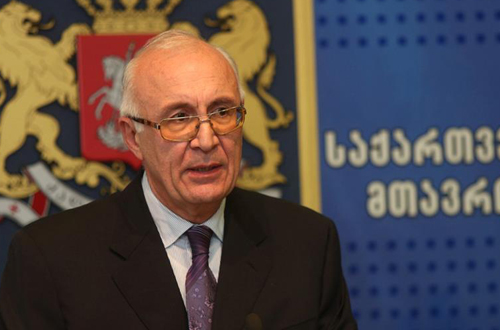- Karasin: 'There is possibility for the recovery in relations';
- Karasin: 'Meeting was informative and business-like';
- Karasin: 'We will try to find solutions';
- Abashidze: 'We agree to disagree on some issues';
- 'Trade, economy, humanitarian issues are starting point for dialogue';
- Abashidze: 'We have agreed to continue this dialogue on a regular basis';

Georgian PM’s Special Representative for Relations with Russia, Zurab Abashidze, at a news conference on November 1. Photo: PM’s press office
Georgian PM's special representative Zurab Abashidze and Russia's Deputy Foreign Minister Grigory Karasin met in Switzerland on December 14 and agreed to continue direct dialogue - first of this kind since the August 2008 war - on trade, economy and humanitarian issues, the two diplomats said.
Talks, which lasted for "almost four hours", were held in "Geneva outskirts", according to Abashidze, whom Georgia's new PM Bidzina Ivanishvili appointed as his special representative for relations with Russia on November 1.
Remarks made separately by the two diplomats after the meeting were largely in line with each other and apparently were pre-agreed with each other during the meeting.
"We agreed to disagree on certain issues, so we have defined issues like trade relations, humanitarian and cultural ties and resumption of regular flights as a starting point [for a dialogue] . We have agreed to continue dialogue in this format on the regular basis," Abashidze said.
Deputy Foreign Minister Karasin, who said that he was acting upon the instructions of Russian President Vladimir Putin, described the meeting with Abashidze "informative and business-like".
"We have noted, that bilateral inter-state relationship between Russia and Georgia are deadlocked and these [relations] need to be recovered and to be brought on to concrete forms of interaction without detriment to political position of Russia. This first meeting was dedicated to this issue," Karasin told RIA Novosti news agency after talks with Abashidze.
"Despite of all the difficulties, which have been amassed over the period of Saakashvili's rule, there still are possibilities for the recovery in [relationship between Georgia and Russia]," Karasin said.
He said that the agreement was reached "to find time and place" to continue this dialogue. He also said that need for such a dialogue "has matured".
"Political and economic circumstances require it," he continued. "Acting upon instructions from the President of the Russian Federation and the Prime Minister of Georgia, we will try to find solutions corresponding interests of our two states."
Speaking with Tbilisi-based Maestro TV via phone from Geneva, Abashidze said that he would keep in touch with Karasin in order to define "frequency of further meetings."
When he was appointed on this post of Georgian PM's special envoy, Abashidze said that Georgia had its 'red lines' involving territorial integrity and its freedom to choose alliances in terms of Euro-Atlantic integration.
Abashidze told Maestro TV that these 'red lines' were not touched upon during the meeting with Karasin. He said these issues, in particular those related to breakaway regions, were addressed in frames of Geneva talks. He reiterated the Georgian government's position that his dialogue with Karasin should proceed without any detriment to Geneva talks, which were launched after the August, 2008 war and which are co-chaired by EU, UN and OSCE representatives.
"We do not want in any way to damage the Geneva discussions," Abashidze said and stressed that his meeting with Karasin, who is also Russia's chief negotiator in Geneva talks, was held "in the outskirts of Geneva" in order to prevent any possible perception of linkage between new format of dialogue with Russia and the Geneva talks.
Georgia and Russia cut diplomatic relations after the August, 2008 war and the two countries have mainly been communicating with each other through Swiss diplomats, who have acted as mediators for number of occasions between Tbilisi and Moscow since the war. The most significant of them was the Swiss-mediated Georgian-Russian talks over Russia's WTO accession and before that the Swiss diplomats were also engaged as mediators in talks over reopening of Kazbegi-Zemo Larsi border crossing point between Georgia and Russia.

 RSS
RSS Mobile
Mobile Twitter
Twitter Facebook
Facebook